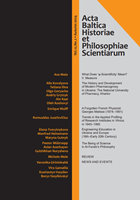Engineering Education in Ukraine and Europe (18th–Early 20th Century)
Engineering Education in Ukraine and Europe (18th–Early 20th Century)
Author(s): Elena Tverytnykova, Manfred Heinemann, Maryna GutnykSubject(s): History of ideas, School education, Vocational Education, Higher Education , History of Education, 18th Century, 19th Century, Pre-WW I & WW I (1900 -1919), Sociology of Education
Published by: Tallinna Tehnikaülikooli õiguse instituut
Keywords: archives; Europe; European technical schools; history of engineering education; history of science; primary sources; Ukraine;
Summary/Abstract: The article examines the system of engineering education in European countries, analyzing the formation of polytechnical education in France on the example of l'École Polytechnique (the Polytechnic School of Paris), which became the foundation of the French educational model and influenced the subsequent development of engineering education not only in France but also in Europe. The article also highlights the process of preparing engineering professionals in Germany, one of the features of which was the introduction of vocational training. It was a type of study separate from the general system, with funding coming from local budgets or private sponsors. This strengthened the role of technical universities, which focused not only on the transmission of accumulated knowledge but also on fostering motivation for learning and scientific activities. The curricula of technical universities gradually expanded to include components of physics, mechanics, mathematics, and chemistry. In addition, the article outlines the influence of European engineering studies on the formation of the engineering education system in Ukraine. Advances in industry created a demand for engineers with diverse specialties, which led to the establishment of an effective training system, taking into account European experience. The organizational and pedagogical contributions of Viktor Lvovich Kyrpychov to the development of domestic engineering education have been significant. However, during the massification of engineering education in the second half of the 20th century, certain issues emerged, including the fragmentation of the system and a decline in interest in professional engineering education. The more than century-old experience of training engineers in Europe and Ukraine, based on the combination of “education–science–production,” can be valuable in preparing qualified professionals for today’s labor market. By integrating the principles of education, scientific research, and practical application, the engineering education system can produce competent specialists capable of thriving in modern conditions.
Journal: Acta Baltica Historiae et Philosophiae Scientiarum
- Issue Year: 12/2024
- Issue No: 2
- Page Range: 110-134
- Page Count: 25
- Language: English

